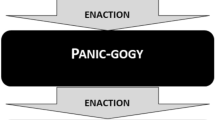Abstract
Following Vygotsky’s seminal idea of semiotic mediation, the theoretical framework of Theory of Semiotic Mediation is used in this research to create and implement learning activities that can possibly allow future teachers to analyse semiotic potential of several technological artefacts, namely applets, identifying the knowledge and the mathematical procedures produced with their use. Because of the global pandemic, it was necessary and imperative to shift from in-person classes to online classes. In this line, new research’ challenges have been posed in educational environments. In this paper, an overall reflection is presented about how these challenges were faced as new opportunities for the understanding of pre-service teachers’ learning in this new reality.
Access this chapter
Tax calculation will be finalised at checkout
Purchases are for personal use only
Similar content being viewed by others
References
Vygotsky, L.S.: Mind in Society. The Development of Higher Psychological Processes. Harvard University Press, Cambridge (1978)
Peixoto, J., Carvalho, R.: Mediação Pedagógica Midiatizada pelas Tecnologias? Teoria e Prática da Educação. 14, 31–38 (2011)
Daher, W.: Preservice teachers’ perceptions of applets for solving mathematical problems: need, difficulties and functions. Educ. Technol. Soc. 12(4), 383–395 (2009). ISSN 1436-4522
Terrel, R.: Applets for mathematical learning. In: Habre, S. (ed.) Enhancing Mathematics Understanding through Visualization: The Role of Dynamical Software, chap. 8, pp. 145–152. Information Science Reference, Hershey (2013). https://doi.org/10.4018/978-1-4666-4050-4
Fernandes, E., Lopes, P.C., Martins, S.: Learning Scenarios with Robots Leading to Problem-Solving and Mathematics Learning. In: Amado, N., Carreira, S., Jones, K. (eds.) Broadening the scope of research on mathematical problem solving: Focus on Technology, Creativity and Affect, pp. 129–152. Springer, New York (2018). https://doi.org/10.1007/978-3-319-99811-9-16
Fernandes, E., Martins, S.: Learning scenarios with robots for the learning of STEM. In: 11th Annual International Conference of Education, Research and Innovation, pp. 5811–5817. IATED, Seville (2018). https://doi.org/10.21125/iceri.2018
Martins, S.: Learning sciences through a robotics project. In: Costa, M.F., Dorrío, B.V. (eds.) Hands-on Science. Growing with Science. Hands-on Science Network, pp. 123–128 (2017). ISBN 978-84-8158-737-1
Martins, S., Fernandes, E.: Aprender Matemática num projeto interdisciplinar com robots. Revista Tecnologias na Educação. 7(13), 1–12 (2015). ISSN 1984-4751
Martins, S., Fernandes, E.: Robots na Aprendizagem das STEAM. In: Duarte A.C., Cristóvão, N. (eds.) Educação, Artes e Cultura: Discursos e Práticas, pp.188–202. CIE-UMa, Funchal (2020). ISBN 978-989-54390-3-4
Martins, S.: Applets como artefactos de mediação semiótica na formação inicial de professores na Licenciatura em Educação Básica. Quadrante. 29(1), 74–96 (2020). ISSN 2183-2838
Bartolini Bussi, M.G., Mariotti, M.A.: Semiotic mediation in the mathematics classroom: artefacts and signs after a Vygotskian perspective. In: English, L., Bartolini Bussi, M., Jones, G., Lesh, R., Tirosh, D. (eds.) Handbook of International Research in Mathematics Education, 2nd revised edition, pp. 746–783. Lawrence Erlbaum, Mahwah (2008). ISBN 978-0805858761
Mariotti, M.A.: ICT as opportunities for teaching–learning in a mathematics classroom: the semiotic potential of artefacts. In: Tso, T.Y. (ed.) 36th Conference of the International Group for the Psychology of Mathematics Education, vol. 1, pp. 25–35. PME, Taipei (2012)
Bereiter, C.: Design Research for Sustained Innovation. Cogn. Stud. Bull. Jpn. Cogn. Sci. Soc. 9(3), 321–327 (2002). https://doi.org/10.11225/jcss.9.321
Amado, J.: Manual de Investigação Qualitativa em Educação, 3rd ed. Imprensa da Universidade de Coimbra, Coimbra (2017). https://doi.org/10.14195/978-989-26-0879-2
Mariotti, M.A., Maffia, A.: From using artefacts to mathematical meanings: the teacher’s role in the semiotic mediation process. Didattica della matematica. Dalle ricerche alle pratiche d’aula. 3, 50–63 (2018). https://doi.org/10.33683/ddm.18.3
Mariotti, M.A.: Introducing students to geometric theorems: how the teacher can exploit the semiotic potential of a DGS. ZDM Math. Educ. 45(3), 441–452 (2013). https://doi.org/10.1007/s11858-013-0495-5
Rabardel, P.: Les hommes et les technologies – Approche cognitive des instruments contemporains. Armand Colin, Paris (1995). ISBN 978-2200215699
Redmond, P., Heffernan, A., Abawi, L., Brown, A., Henderson, R.: An online engagement framework for higher education. Online Learn. J. 22(1), 183–204 (2018). https://doi.org/10.24059/olj.v22i1.1175
Castro Superfine, A.: Conducting research in the time of pandemic: a pause or an opportunity? J. Math. Teach. Educ. 23(5), 429–431 (2020). https://doi.org/10.1007/s10857-020-09478-w
Acknowledgments
The author acknowledges the financial support from the FCT grant with reference project UIDB/04083/2020.
Author information
Authors and Affiliations
Corresponding author
Editor information
Editors and Affiliations
Rights and permissions
Copyright information
© 2021 Springer Nature Switzerland AG
About this paper
Cite this paper
Martins, S. (2021). Designing Didactic Cycles in a Pandemic Scenario: Facing Challenges as Opportunities. In: Reis, A., Barroso, J., Lopes, J.B., Mikropoulos, T., Fan, CW. (eds) Technology and Innovation in Learning, Teaching and Education. TECH-EDU 2020. Communications in Computer and Information Science, vol 1384. Springer, Cham. https://doi.org/10.1007/978-3-030-73988-1_18
Download citation
DOI: https://doi.org/10.1007/978-3-030-73988-1_18
Published:
Publisher Name: Springer, Cham
Print ISBN: 978-3-030-73987-4
Online ISBN: 978-3-030-73988-1
eBook Packages: Computer ScienceComputer Science (R0)




